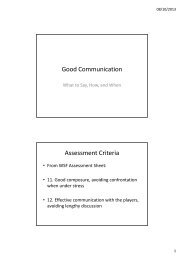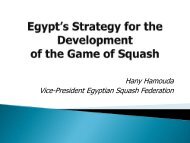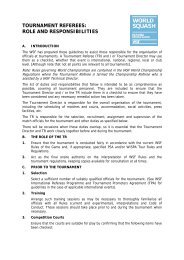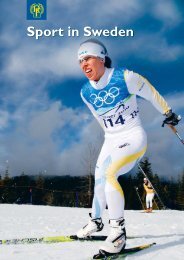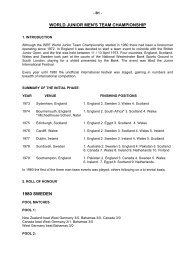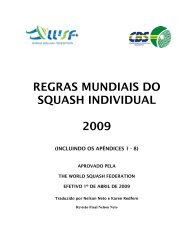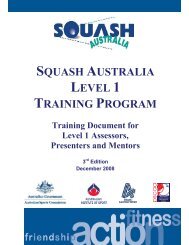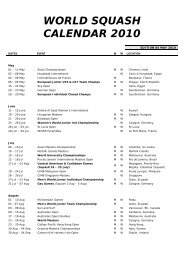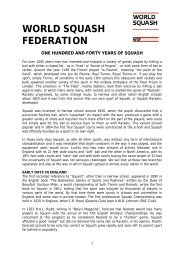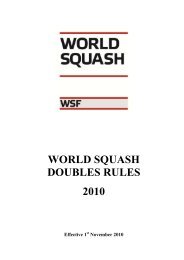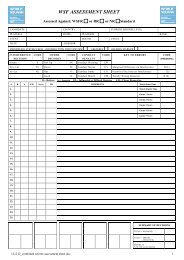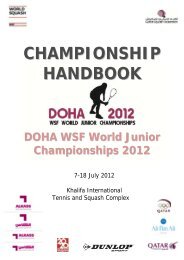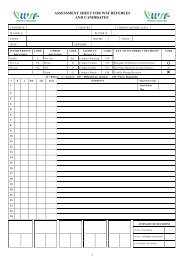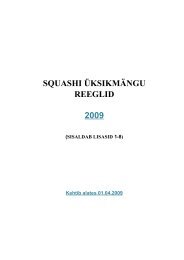CBTA Programme - World Squash Federation
CBTA Programme - World Squash Federation
CBTA Programme - World Squash Federation
Create successful ePaper yourself
Turn your PDF publications into a flip-book with our unique Google optimized e-Paper software.
<strong>CBTA</strong> <strong>Programme</strong><br />
For the Appointment of<br />
WSF International Referees<br />
May 2010
Contents<br />
Section 1: Introduction ................................................................................................................................... 3<br />
1.1 Purpose of the <strong>Programme</strong> ............................................................................................................ 3<br />
1.2 Referees' Code of Conduct ............................................................................................................ 3<br />
1.3 Appointment .................................................................................................................................. 3<br />
Section 2: Previous Experience ...................................................................................................................... 4<br />
2.1 Entry Pre-Requisites ...................................................................................................................... 4<br />
2.2 Recognition of Prior Learning ....................................................................................................... 4<br />
Section 3: Competency Statements and Training ........................................................................................... 5<br />
3.1 Competency Statements ................................................................................................................ 5<br />
3.2 Training <strong>Programme</strong> Syllabus ....................................................................................................... 5<br />
3.3 Seminar - Interpreting the Rules and Decision-Making for International Candidates .................. 6<br />
Section 4: Assessment and Nomination ......................................................................................................... 7<br />
4.1 Seminar .......................................................................................................................................... 7<br />
4.2 Practical Refereeing ...................................................................................................................... 7<br />
4.3 Assessment Standards ................................................................................................................... 7<br />
4.4 Assessment Tool ............................................................................................................................ 7<br />
4.5 Nomination .................................................................................................................................... 7<br />
Section 5: Practical Refereeing ...................................................................................................................... 8<br />
5.1 Refereeing Activity ....................................................................................................................... 8<br />
5.2 Tutoring and Mentoring ................................................................................................................ 8<br />
Section 6: Ongoing Nomination and Appointment ........................................................................................ 9<br />
6.1 Re-Nomination .............................................................................................................................. 9<br />
6.2 Assessment Failures ...................................................................................................................... 9<br />
6.3 Re-Appointment ............................................................................................................................ 9<br />
Appendix 1 Assessment Standards for the International Level ...................................................................... 10<br />
2
Section 1: Introduction<br />
1.1 Purpose of the <strong>Programme</strong><br />
The purpose of this programme is to detail the requirements for training, assessing and nominating<br />
candidates who wish to be appointed <strong>World</strong> <strong>Squash</strong> <strong>Federation</strong> (WSF) International level referees.<br />
The International designation is the first refereeing level administered by WSF.<br />
1.2 Referees’ Code of Conduct<br />
WSF has adopted a Code of Conduct for International Referees and Assessors. All candidates are<br />
required to observe this Code. They are also required to sign the Code in jurisdictions where this is<br />
not inconsistent with the law.<br />
1.3 Appointment<br />
Candidates for the International designation are nominated by their Member Nation or Region and<br />
appointed by the WSF Management Committee based on recommendations made by the WSF<br />
Review Board. The Review Board will not recommend the appointment of candidates who do not<br />
meet the requirements of this programme. International Referees are appointed initially for a 1-year<br />
period. Re-appointments are usually for a 3-year period (see Section 6.3).<br />
3
Section 2: Previous Refereeing Experience<br />
2.1 Entry Pre-Requisites<br />
Prior to completing this training programme, candidates shall:<br />
<br />
<br />
<br />
<br />
Be an accredited National or Regional level referee meeting the requirements of the WSF<br />
<strong>CBTA</strong> programmes for these levels.<br />
Have passed a rules examination approved by the WSF.<br />
Have passed the WSF General Principles for Officials Advanced Level course.<br />
Have signed the WSF Code of Conduct for International Referees and Assessors (see Section<br />
1.2)<br />
Have natural or corrected 20-20 vision and good hearing, as verified by a qualified medical<br />
professional.<br />
When nominating candidates for International appointment, Member Nations or Regions must<br />
certify that candidates have satisfied these pre-requisites.<br />
2.2 Recognition of Prior Learning (RPL)<br />
While the WSF accepts the principle of the recognition of prior learning, it will not apply at the<br />
International level.<br />
4
Section 3: Competency Statements and Training<br />
3.1 Competency Statements<br />
In order to be appointed as a WSF International Referee, candidates must:<br />
<br />
<br />
<br />
<br />
<br />
<br />
<br />
<br />
<br />
<br />
<br />
<br />
Demonstrate a comprehensive understanding of the Rules and their interpretation and apply the<br />
Rules in accordance with accepted international interpretations<br />
Make correct decisions on interference, including minimal interference<br />
Make correct decisions on other areas of the rules<br />
Demonstrate consistency in decision-making<br />
Demonstrate an understanding of the movement of players when going to and when moving off<br />
the ball<br />
Demonstrate an understanding of swing-interference<br />
Demonstrate an understanding of a player’s effort to play the ball<br />
Demonstrate an understanding of a winning shot at the elite level<br />
Understand the context of the match<br />
Demonstrate control of the match using the Conduct rule, if necessary<br />
Demonstrate composure in stressful situations<br />
Communicate effectively with players<br />
3.2 Training <strong>Programme</strong> Syllabus<br />
Candidates must complete a seminar on interpreting the rules and decision-making in elite-level<br />
matches, which can be found in Section 3.3. In addition, a candidate’s knowledge of the Rules will<br />
be assessed during the candidate’s refereeing activity (as observed by a WSF Assessor).<br />
5
3.3 Seminar - Interpreting the Rules and Decision-Making for International Candidates<br />
This seminar will introduce candidates to the range of skills that enable International Referees to<br />
officiate effectively in squash matches involving elite level players.<br />
1. Nominal Duration<br />
4 hours<br />
2. Seminar Aims<br />
This seminar will introduce participants to the main requirements for becoming an<br />
International Referee. A successful candidate for International Referee will:<br />
Demonstrate a comprehensive understanding of the Rules and their interpretation and<br />
apply the Rules in accordance with accepted international interpretations<br />
Make correct decisions on interference, including minimal interference<br />
Make correct decisions on other areas of the rules<br />
Demonstrate consistency in decision-making<br />
<br />
<br />
<br />
<br />
<br />
<br />
Demonstrate an understanding of the movement of players when going to and when<br />
moving off the ball<br />
Demonstrate an understanding of swing-interference<br />
Demonstrate an understanding of a player’s effort to play the ball<br />
Demonstrate an understanding of a winning shot at the elite level<br />
Demonstrate control of the match using the Conduct rule, if necessary<br />
Communicate effectively with players<br />
3. Seminar Content<br />
The seminar will include sections on:<br />
Decision-making at the elite level<br />
Player tactics at the elite level<br />
Interpreting the behaviour of elite level players<br />
Dealing with poor conduct<br />
Stress management<br />
Communicating with players<br />
4. Delivery Strategies<br />
Seminar including DVD<br />
Practical refereeing<br />
5. Resources<br />
Current WSF <strong>World</strong> <strong>Squash</strong> Singles Rules<br />
WSF “Guide to Understanding the Rules of <strong>Squash</strong>”<br />
WSF Refereeing DVD “Calling the Shots”<br />
WSF General Principles for Officials, Introductory and Advanced Level presenter’s kits –<br />
Stress Management, Communications and Negotiation content only<br />
6
Section 4: Assessment and Nomination<br />
The assessment process at the International level is undertaken primarily during a candidate’s<br />
refereeing activity. However, evaluation during the seminar on Interpreting the Rules and Decision-<br />
Making for International Candidates may also be carried out.<br />
4.1 Seminar<br />
Informal assessment may be done during the seminar by requiring candidates to fill in the answer<br />
sheets supplied with the WSF DVD “Calling the Shots”. Formal assessment is done in Section 4.2.<br />
4.2 Practical Refereeing<br />
The major test of competence is conducted through the assessment of the candidate’s refereeing by<br />
a WSF Assessor. A satisfactory demonstration of refereeing skills is required on <strong>Squash</strong> matches:<br />
4.2.1 of appropriate international standard and difficulty as defined in Section 5.1;<br />
4.2.2 that last at least four games and in which the candidate has to make at least 25<br />
decisions, of which a significant number are difficult rather than easy; and<br />
4.2.3 with at least 90% of the decisions made rated as correct and consistent.<br />
4.3 Assessment Standards<br />
The assessment standards for the International level are included in Appendix 1.<br />
4.4 Assessment Tool<br />
4.4.1 An assessment tool (the WSF International Referee Assessment Sheet) is used, in<br />
conjunction with the Guidelines for WSF Assessors, to measure the candidate’s<br />
demonstration of the required knowledge and skills detailed in all of the competencies<br />
listed in Section 3.1. In order to pass, the candidate must be rated as competent on all<br />
aspects of the assessment tool.<br />
4.4.2 The WSF International Referee Assessment Sheet and the Guidelines for WSF<br />
Assessors are available from the WSF Office.<br />
4.5 Nomination<br />
4.5.1 To be eligible for nomination as an International Referee, a candidate must, in a 3-year<br />
period, receive at least 3 passing assessments in matches from the categories in<br />
Section 5.1.1, at least 2 of which must be on matches between PSA players both<br />
ranked in the top 30 at the time of the match.<br />
4.5.2 The assessments in 4.5.1 must be from at least two WSF Assessors.<br />
7
Section 5: Practical Refereeing<br />
Refereeing practice is integral to achieving competency for <strong>Squash</strong> referees. The quantity and<br />
levels of refereeing activity required for initial and ongoing appointment are specified in this<br />
section.<br />
5.1 Refereeing Activity<br />
In order to achieve a satisfactory level of activity, a candidate must fulfil the requirements both of<br />
5.1.1 and 5.1.2:<br />
5.1.1 Within a 3-year period, a candidate must have refereed at least 15 matches which<br />
conformed to the following standards:<br />
5.1.1.1 Any tournament or recognised match (but not exhibitions) involving players,<br />
both of whom are PSA players ranked in the top 150 or WISPA players both<br />
ranked in the top 75 at the time of the match. A candidate claiming a match<br />
under this sub-paragraph as a valid activity is required to state the<br />
PSA/WISPA ranking of the players at the time the match was played; or<br />
5.1.1.2 Any quarter-final or subsequent match in the championship draws in either<br />
individual or team events in any of the following events: WSF <strong>World</strong><br />
(Senior) Championships, WSF <strong>World</strong> Team (Senior) Championships; or<br />
Commonwealth Games; or<br />
5.1.1.3 Any semi-final or subsequent match in the championship draws in either<br />
individual or team events in the WSF <strong>World</strong> Junior Men’s Championships; or<br />
5.1.1.4 Any other match considered to be of an appropriate level by a WSF Assessor<br />
assessing the match; and<br />
5.1.2 Of these 15 matches, at least 10 must be men’s matches and at least 5 must be matches<br />
between PSA players both ranked in the top 50.<br />
5.2 Tutoring and Mentoring<br />
In addition to appointing International-level assessors to assess the candidate, International or<br />
<strong>World</strong> referees should be appointed to tutor and mentor the candidate during practical refereeing.<br />
The role of the tutor is to provide encouragement, constructive advice and feedback on the<br />
candidate’s performance at an individual tournament. The role of the mentor is to establish a<br />
longer-term relationship with the candidate to provide encouragement, constructive advice and<br />
feedback on the candidate’s performance. This tutoring and mentoring is crucial in helping the<br />
candidate to meet the assessment standards and to achieve his or her potential as a referee.<br />
8
Section 6: Ongoing Nomination and Appointment<br />
6.1 Re-Nomination<br />
To be eligible for re-nomination, International referees must:<br />
6.1.1 Continue to referee the number and standard of matches specified in Section 5.1.<br />
6.1.2 Where the Rules of <strong>Squash</strong> have changed since the referee was last accredited, attend<br />
a course on rule changes or pass a Rules Examination approved by the WSF.<br />
6.1.3 Continue to be assessed and pass in accordance with the requirements in Section 4.5.<br />
6.1.4 If appointed for a 1-year period, in addition to meeting the requirements of Section 4.5<br />
over the preceding 3 years, during the 1-year period must have received at least 1<br />
passing assessment on a match between PSA players both ranked in the top 30 at the<br />
time of the match.<br />
6.1.5 Continue to have natural or corrected 20-20 vision and good hearing, as verified by a<br />
qualified medical professional.<br />
6.2 Assessment Failures<br />
In accordance with the WSF Quality Control Policy, if a referee fails an assessment, the referee<br />
must be referred to a WSF Assessor for guidance and assessed again within 6 months. If this second<br />
assessment is again a failure, the referee becomes inactive and must apply again for appointment in<br />
accordance with the requirements of Section 4.5.<br />
6.3 Re-Appointment<br />
Re-appointments are made usually for a 3-year period. However, re-appointment may be made for a<br />
1-year period in accordance with Section 6.1.4 if it is considered that the referee’s performance<br />
requires review within a shorter period.<br />
9
Appendix 1<br />
Assessment Standards for the International Level<br />
Competencies<br />
Assessment Standard<br />
1. Demonstrate a comprehensive<br />
understanding of the Rules and their<br />
interpretation and apply the Rules in<br />
accordance with accepted international<br />
interpretations<br />
Knows thoroughly all rules arising in a match and<br />
applies them correctly<br />
2. Make correct decisions on<br />
interference, including minimal<br />
interference<br />
3. Make correct decisions on other areas<br />
of the Rules<br />
4. Demonstrate consistency in decisionmaking<br />
Almost all decisions on interference correct<br />
- no more than 10% error rate<br />
- no totally wrong decisions<br />
Almost all decisions on other areas correct<br />
- no more than 10% error rate<br />
- no totally wrong decisions<br />
Good consistency in decision-making<br />
5. Demonstrate an understanding of the<br />
movement of players when going to<br />
and when moving off the ball<br />
6. Demonstrate an understanding of<br />
swing-interference<br />
7. Demonstrate an understanding of a<br />
player’s effort to play the ball<br />
8. Demonstrate an understanding of a<br />
winning shot at the elite level<br />
Almost all decisions on movement of the players<br />
correct<br />
- no more than 2 or 3 marginal differences<br />
- no more than 1 or 2 incorrect decisions<br />
- no totally wrong decisions<br />
Almost all decisions on swing-interference correct<br />
- no more than 2 or 3 marginal differences<br />
- no more than 1 or 2 incorrect decisions<br />
- no totally wrong decisions<br />
Almost all decisions on player’s effort to play the<br />
ball (including minimal) correct<br />
- no more than 2 or 3 marginal differences<br />
- no more than 1 or 2 incorrect decisions<br />
- no totally wrong decisions<br />
Almost all decisions on winning shots correct<br />
- no more than 2 or 3 marginal differences<br />
- no more than 1 or 2 incorrect decisions<br />
- no totally wrong decisions<br />
9. Understand the context of the match Good understanding of the context of the match<br />
10. Demonstrate control of the match<br />
using the Conduct rule, if necessary<br />
11. Demonstrate composure in stressful<br />
situations<br />
12. Communicate effectively with<br />
players<br />
Good control of the match<br />
Good composure<br />
Good communication with the players<br />
Further explanation of the assessment standards can be found in the Guidelines for WSF Assessors<br />
available from the WSF Office.<br />
10



